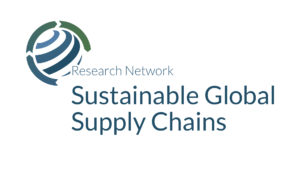
On 9 March 2021, the new Research Network Sustainable Global Supply Chains was officially launched. This network has been prompted by the German Federal Ministry for Economic Cooperation and Development (BMZ) with the aim of undertaking and stimulating new research that helps to make supply chains more sustainable and to screen the best international research on this topic and make it accessible for policymakers and other societal stakeholders.
The launch event was held virtually, attracting over 300 participants across the globe. The event underlined that the need to make global supply chains more sustainable has never been more warranted than now. This call to action was shared by State Secretary Norbert Barthle who graced the opening session of the event with his thought-provoking speech and by all panelists. In the opening panel, moderated by Tilman Altenburg, the panelists including Pol Antrás (Harvard University), Khalid Nadvi (University of Manchester), Roberta Rabellotti (University of Pavia), and Daria Taglioni (World Bank) discussed how supply chain research can help solve societal challenges. Two parallel sessions then discussed the pros and cons of due diligence law as well as new insights from supply chain research and features, among others. The panelists in the parallel session on due diligence law include Gabriel Felbermayr (Institute for World Economy), Markus Krajewski (Friedrich-Alexander University), and Larissa Rodrigues (Instituto Escolhas), while the panelists in the parallel session on the new insights from supply chain research include Victor Stolzenburg, (World Trade Organization), Julia Cajal Grossi (Graduate Institute Geneva), Stefan Pahl (German Institute for Global and Area Studies), and Frauke Steglich (Institute for World Economy).
Overall, there was substantial optimism about making global supply chains more sustainable and the onus now lies with the Research Network to investigate and develop solutions for how this goal can be turned into reality. The network has set out to achieve this objective by leveraging the research expertise of the four partner institutions that make up the network (DIE, GIGA, IfW, and SWP) and the insights of the renowned global supply chain scholars it has attracted internationally. By now, the network has produced two podcasts and blogs and will continue to answer this question through a series of research papers, conferences, policy dialogues, podcasts, and a blog series.
You can stay tuned and be informed about to the activities of the network by subscribing to its newsletter here.

Schreibe einen Kommentar